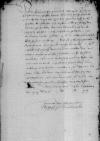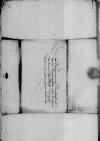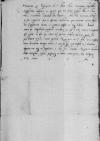List #4386
Ioannes DANTISCUS do Gdańsk Town CouncilHeilsberg (Lidzbark), 1541-03-19
| odebrano Gdańsk (Danzig), 1541-03-25 (fridage vor Letare) Rękopiśmienne podstawy źródłowe:
| ||||
Tekst + aparat krytyczny + komentarz Zwykły tekst Tekst + komentarz Tekst + aparat krytyczny
Den ersamenn und namhafftigenn herren
Unsern freuntlichen grus und alles guts zuvoran. Ersame, namhaffte herren, besondere, guthe freunde. /
Wir haben negst den XV[1] dits mondts uff E(wer) E(rbarkei)t begeren
Dat(um) aus unserm schlos



 APG 300, 53, 268, p. 20
APG 300, 53, 268, p. 20